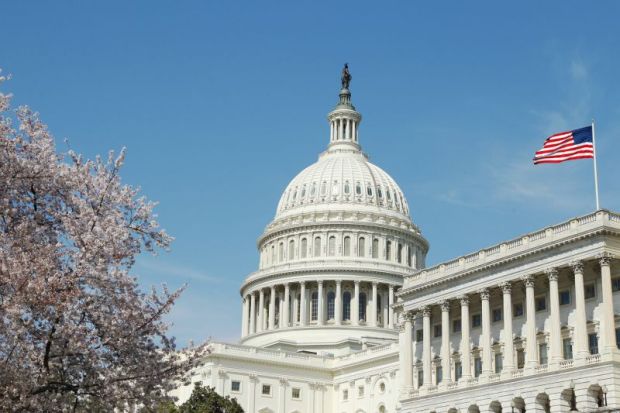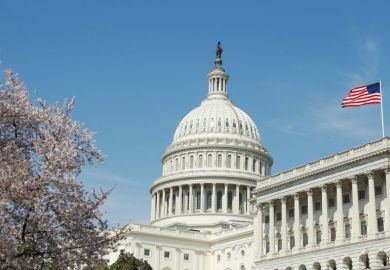Democrats have gained critical leverage to push back against the Trump administration’s higher education policies after they gained control of the US House of Representatives in the midterm elections, in which voters also expressed their support for university funding in a series of local ballots.
Democrats were projected to have gained as many as 35 seats in the 435-member House, previously held by the Republicans with a 240-194 majority. Republicans appeared to have slightly expanded their 51-49 majority in the Senate.
After two years in a government-wide minority position, control of the lower chamber of Congress gives Democrats much greater power to amend or thwart Trump administration policies. In higher education, those policies include toughening conditions on student borrowers, overhauling accreditation rules, and easing the burden on institutions to investigate sexual assault.
Control of a legislative chamber also gives Democrats power to begin subpoena-aided investigations into a range of administration actions. Education is not likely to be a top priority, although the tools could mean new scrutiny of education secretary Betsy DeVos in areas that include civil rights enforcement.
Among individual races, one of the most reviled political figures in terms of higher education policy, Wisconsin governor Scott Walker – who proposed cutting the University of Wisconsin's budget by $300 million (£228 million) and removing tenure protections from state law – lost a close re-election race to Tony Evers, a Democrat currently serving as state superintendent of public instruction.
Mr Walker’s narrow defeat reflected a nation of voters who remain deeply divided on matters of party control and the Trump phenomenon, but largely united from coast to coast in their support for increased spending on higher education.
More than a dozen states posed ballot questions seeking voter approval for billions of dollars in tax increases or new borrowing authority to support education at all levels. With final tallies still being counted, the results appeared to show wins everywhere.
They included Seattle voters approving $620 million in property tax increases for education, with $41 million dedicated to a free college programme for graduates of the city’s public schools.
Montana voters approved $200 million in taxes over 10 years to support the state university system. Three other states agreed to benefit their colleges through borrowing – $136 million in New Mexico, $70 million in Rhode Island, and almost $65 million in Maine.
New Jersey voters backed $500 million in borrowing to benefit education at various levels including its county colleges, with a priority given to those institutions offering credentials below the level of a full degree.
Voters in both Florida and Alabama approved amendments to their state constitutions aimed at preventing changes to the governing structures of their public universities. The Florida language also imposes new limits of tuition increases.
In a topic of concern on many US campuses, Massachusetts voters ratified a state law that prohibits discrimination based on gender identity in public places.
The election’s other winners include J.B. Pritzker, a Democrat and long-time advocate for early childhood education who will become Illinois governor after a campaign of faulting the Republican incumbent, Bruce Rauner, for deep cuts in higher education spending.
Dozens of other education advocates, teachers and scientists ran for federal office, many hoping to counter President Trump and party allies who have rejected scientific consensuses and disparaged academia.
Most of them lost, although at least three academics played key roles in the Democratic capture of the House by taking seats now held by Republicans: Donna Shalala, the former University of Miami president, in Florida; Carolyn Bourdeaux, an associate professor of public management and policy at Georgia State University, in Georgia; and Lauren Underwood, an adjunct instructor in nursing and health studies at Georgetown University, in Illinois.
More than a dozen other academics, mostly Democrats, lost races for House seats across the country. And while Democrats made some progress whittling the Republican advantage among the nation’s governors, they lost some races that featured high-profile debates over education policy.
One, the contest for Maryland governor, featured a Democratic nominee, Ben Jealous, who proposed free community college for the state’s residents. The Republican incumbent, Larry Hogan, responded with a similar plan. Mr Hogan, a political moderate with substantial bipartisan backing, won easily.
In Ohio, Richard Cordray, a Democrat who battled student loan companies in his role as chief of the US Consumer Financial Protection Bureau, narrowly lost his bid for governor to the Republican, Mike DeWine.
And in Arizona, David Garcia, an associate professor of teaching at Arizona State University, lost to incumbent Republican governor Doug Ducey in a contest with disputes over education policy at school level.
Register to continue
Why register?
- Registration is free and only takes a moment
- Once registered, you can read 3 articles a month
- Sign up for our newsletter
Subscribe
Or subscribe for unlimited access to:
- Unlimited access to news, views, insights & reviews
- Digital editions
- Digital access to THE’s university and college rankings analysis
Already registered or a current subscriber? Login








